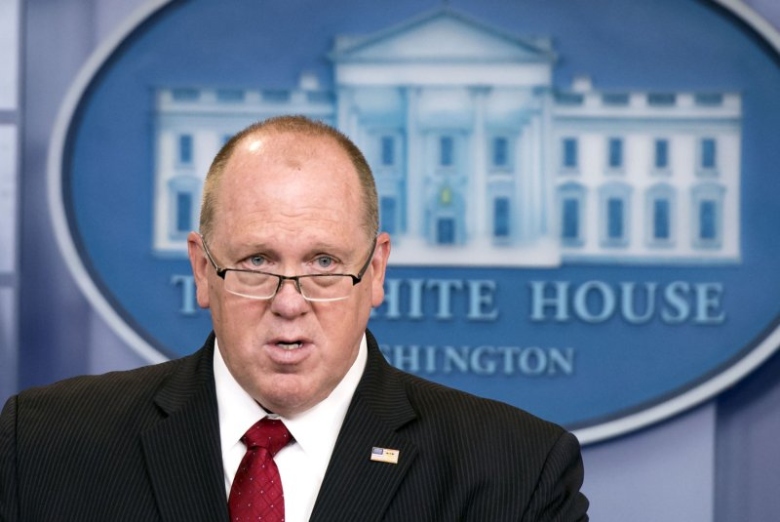President-elect Donald Trump’s administration is exploring unprecedented measures to ramp up immigration enforcement, including leveraging U.S. military resources to deport millions of undocumented immigrants. Thomas Homan, Trump’s appointed “border czar,” disclosed that military bases and aircraft could play a pivotal role in these efforts, setting the stage for a potentially transformative shift in immigration policy.
Anchored In Oklahoma Podcast
In an interview with The Wall Street Journal, Homan described the military as a “force multiplier” capable of enhancing logistical and administrative support for immigration enforcement. He noted that while active-duty military personnel cannot legally arrest or detain immigrants, their resources could significantly aid operations in several key areas:
- Transportation: Military aircraft could expedite the deportation of detainees to their home countries.
- Detention Facilities: Military bases might temporarily house undocumented immigrants awaiting deportation.
- Logistics and Intelligence: Infrastructure support and data analysis could streamline enforcement efforts.
- Administrative Tasks: Military assistance could free immigration agents to focus on arrests and investigations.
Homan highlighted precedents for such involvement, including the Obama administration’s use of military bases to house unaccompanied minors crossing the border and the Biden administration’s reliance on military installations to shelter Afghan refugees during the U.S. withdrawal.
Trump has vowed to declare a national emergency on immigration upon taking office, a move that would grant his administration significant powers to reallocate Pentagon funds and bypass congressional resistance. By invoking these emergency powers, Trump aims to fast-track deportations and bolster border security, fulfilling a cornerstone of his campaign promises.
Homan emphasized the importance of congressional funding, stating, “We’re waiting to see what Congress is going to give us for funding.” The administration’s ability to execute its ambitious agenda hinges on the resources allocated by lawmakers.
The proposal to involve the military has sparked sharp divisions. Proponents argue that utilizing military assets for logistical and administrative tasks is a practical solution to enhance enforcement efficiency. They view it as a necessary step to address longstanding immigration challenges.
Critics, however, warn of the risks of militarizing immigration policy. Civil rights advocates argue that employing military resources for domestic operations could blur the lines between civilian and military roles, setting a dangerous precedent. Legal experts have also raised concerns about potential violations of federal laws prohibiting active-duty military personnel from direct involvement in law enforcement.
The administration’s strategy is expected to face intense legal scrutiny. Congressional Democrats and immigration advocates are likely to challenge both the national emergency declaration and the use of Pentagon funds in court. Critics within Congress may also attempt to restrict funding for these initiatives, citing concerns about constitutional overreach and the undermining of civilian governance.
Trump’s plans for mass deportations remain central to his immigration agenda. The potential use of military bases as detention centers and military planes for deportations could significantly speed up the process. Homan stressed that this support would allow immigration enforcement agents to concentrate on their primary responsibilities without being burdened by logistical hurdles.
Supporters believe that leveraging military resources could address the logistical challenges of deporting millions of undocumented immigrants. However, the approach has intensified fears among immigrant communities and civil rights organizations, who view it as an alarming escalation of enforcement tactics.
The administration’s plans have reignited a fierce national debate over immigration policy and the appropriate role of the military in domestic enforcement. As Trump prepares to take office, his administration’s actions will be closely watched by supporters and critics alike. The legal and political battles over these measures are likely to define the early days of his presidency.
Homan has indicated that more details about the operational framework and funding for these initiatives will be unveiled in the coming weeks. Whether the military’s involvement will enhance efficiency or deepen divisions remains uncertain. What is clear, however, is that Trump’s approach has set the stage for a contentious and highly scrutinized immigration crackdown.
With the inauguration on the horizon, the administration’s commitment to addressing illegal immigration is unequivocal. The outcome of these efforts will hinge on the balance between legal challenges, political opposition, and the administration’s resolve to fulfill its promises. The nation braces for an intense debate over the future of immigration enforcement and the unprecedented role of military resources in shaping it.



Use military aircraft to carpet bomb uncooperative Nations with illegal aliens.
Build forts on the boarder and send out patrols to protect the USA.